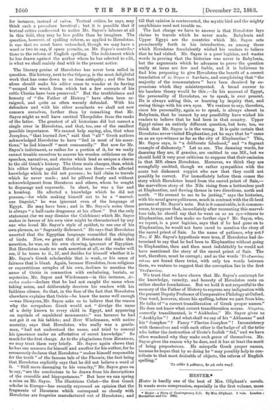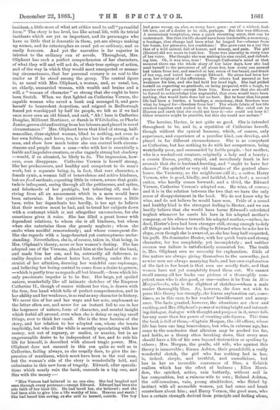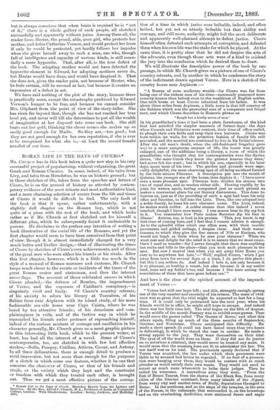HESTER.*
Hester is hardly one of the best of Mrs. Oliphant's novels. It wants more compression, especially in the first volume, more • Hasler: a Story rif Contemporary lefe. By Mrs. Oliphant. 3 vols. London : Macmillan and Co. 1868.
incident, a little more of what art critics used to call "pyramidal form." The story is too level, too like actual life, with its trivial incidents which are yet so important, and its personages who have so little that is dramatic in them, yet are always making up scenes, and its catastrophes so cruel yet so ordinary, and so easily foreseen. And yet the narrative is far superior in interest to the ordinary run of novels. Throughout, Mrs. Oliphant has such a perfect comprehension of her characters, of what they will and will not do, of their true springs of action, and of the way in which they would meet unexpected or menac- ing circumstances, that her personal scenery is as real to the reader as if he stood among the group. The central figure is, as usual with Mrs. Oliphant, a woman, and, as usual, too, an elderly, unmarried woman, with wealth and brains and a will, a "woman of character" so strong that she ought to have been Scotch. When we first lighted on Catherine Vernon, the capable woman who saved a bank and. managed it, and gave herself to benevolent despotism, and reigned in Redborough feared yet worshipped by half its people, we felt as if we had once more seen an old friend, and said, "Ah ! here is Catherine Douglas, Millicent Mortimer, or Sarah in Whiteladies, or Phcebe Junior, grown old and resting from her labours, and placed in novel circumstances !" Mrs. Oliphant loves that kind of strong, half- masculine, clear-sighted woman, blind to nothing, not even to her own foibles, and loves, too, to place her in the position of a man, and show how much better she can control both circum- stances and people than a man—who with her is essentially a feeble and impulsive creature, or else vaguely strong but shadowy —would, if so situated, be likely to do. The impression, how- ever, soon disappears. Catherine Vernon is herself strong, like her predecessors, and healthy and competent to do man's work, but a separate being, is, in fact, that rare character, a female cynic, a woman full of benevolence and active kindness, but au fond sardonic, expecting little in return, aware that grati- tude is infrequent, seeing through all the pettinesses, and spites, and falsehoods of her proteg6s, but tolerating all, and de- riving from all an amusement which in a man would have been saturnine. In her cynicism, too, she becomes a little base, rules her dependents too hardly, is too apt to believe that their motive must be bad, and to tread her subjects down with a contempt which is_ not altogether unzonscious, for she sometimes gives it voice. She has filled a great house with dependent relatives, to whom she is all kindness, but whom when she entertains them she grossly neglects ; whom she snubs when needful remorselessly; and whose consequent dis- like she regards with a large-hearted yet contemptuous under- standing. Nevertheless, she is, of course, taken in, that being, in Mrs. Oliphant's theory, more or less women's destiny. She has adopted one of the Vernons, placed him at the head of the bank, and made him her son, and he, outwardly all deference, in reality despises and almost hates her, fretting under the re- straint of her affection, deeming her watchful care espionage, and believing her loving control to come from a desire to govern, —which is partly true as regards all but himself, —from which his only passionate impulse is to be free. Her large, yet spoiled nature, wonderfully like all intimate sketches of the Empress Catherine II., though of course without her vice, is drawn with the firm, free hand which tells of perfect comprehension, and in her ability and her weakness, is as real as any character in history. We never tire of her and her ways and her acts, unpleasant as the latter often are, and never for an instant fail to see in her the largeness of nature, force of character, and mental insight which forbid all around, even when she is doing or saying small things, ever to think her small. She is the true heroine of the story, and her relation to her adopted son, whom she trusts implicitly, but who all the while is secretly speculating with her money, not out of roguery, or malice, or avarice, but in an ungovernable desire to be independent of her, and to rule his life for himself, is described with almost tragic power. Mrs.
Oliphant does not succeed in this son quite so well as in Catherine, failing always, as she usually does, to give the im- pression of manliness, which must have been in the real man, but the woman's side of the story is wonderfully told, and culminates in this new form of tragedy. Edward, after specula- tions which nearly ruin the bank, succeeds in a big one, and flies with the money :—
" Miss Vernon had believed in no one else. She had laughed and seen through every pretence—except Edward. Edward had been the sole faith of her later life. He had loved her, she believed ; and she had been able to give him a life worthy of him. Heaven and earth ! She had heard him raving, as she said to herself, outside. The boy had gone wrong, as, alas, so many have gone : out of a wicked, fool- ish love, out of a desire to be rich, perhaps. But this was different. A momentary temptation, even a quick recurring error, that can be understood. But that his life should have been intolerable, a monotony, a bondage, that change had been what he longed for—change from her house, her presence, her confidence ! She gave vent to a cry like that of a wild animal, full of horror, and misery, and pain. The girl (Hester) did not mean to hurt her. There was sincerity in every tone of her voice. She thought she was making his sins venial, and defend- ing him. Oh, it was true, true ! Through Catherine's mind at that moment there ran the whole story of her later days, how she had used herself to the pretences of all about her, how every one around had taken from her, and snarled at her, eaten of her bread, and drunk of her cup, and hated her—except Edward. He alone had been her prop, her religion of the affections. The others had sneered at her weakness for him, and she had held her head high. She had prided herself on expecting no gratitude, on being prepared, with a laugh, to receive evil for good—except from him. Even now that she should be forced to acknowledge him ungrateful, that even would have been nothing, that would have done her no hurt. I)ut to hear that his past life had been a burden, a bondage, a monotony, that freedom was what he longed for—freedom from her ! The whole fabric of her life crushed together and rocked to its foundations. She cried out to Heaven and earth that she could not bear it—she could not bear it ! Other miseries might be possible, but this she could not endure."
The heroine, Hester, is not quite so good. She is intended throughout to be, and is, a repetition of Catherine herself, though without the cynical humour, which, of course, only experience, and experience of a peculiar kind, can develop, and placed in far different circumstances. She is as competent as Catherine, but has nothing to do with her competence, being wretchedly poor, and surrounded by feeble people,--her mother, who is a washed-out creature, originally a lady and a beauty ; a cousin Emma, pretty, stupid, and mercilessly frank in her avowals that she is husband-hunting, and "ought to have her chance ;" the spiteful or very old inmates of the genteel alms- house, the Vernonry, as the neighbours call it; a suitor, Harry Vernon, who is good, kindly, and faithful, but a fool ; a second suitor, who hardly comes forward ; and a third, the Edward Vernon, Catherine Vernon's adopted son. He wins, of course; and it is in the relation between the two that we have the only sense of disappointment in the book. W.e do not know why he wins, and do not believe he would have won. Pride of a sound
and healthy kind is the strongest feeling in Hester, and we can hardly believe that she would have borne Edward's calculated neglect whenever he meets his love in his adopted mother's company, or his silence towards his adopted mother,—unless, in- deed, Hester's love had been stronger still, strong enough to defy all things and induce her to cling to Edward when he asks her to elope, even though she is aware of, as she has long half suspected, his guilt. He dominates Hester, with her quick brain and strong character, far too completely, yet incompletely ; and neither success nor failure is satisfactorily accounted for. The truth is, Mrs. Oliphant sees no necessity for explanation. Girls of fine nature are always giving themselves to the unworthy, just
as wise men arc always marrying fools, and her own explanation of the fact in her heart is that men are mostly fools, and that women have not yet completely found them out. We cannot recall among all her books one picture of a thoroughly com- petent man who is also good, or one—unless it be Tom in Miss Marjori banks, who is the slightest of sketches—whom a male reader thoroughly likes. As, however, she does not wish to press this theory too strongly, she leaves explanation out, some- times, as in this case, to her readers' bewilderment and annoy- ance. The facts granted, however, the situations are clew and exciting, and Mrs. Oliphant's power of writing bright and interest- ing dialogue, dialogue with thought and purpose in it, never fails her any more than her power of creating side figures. Thii time the book is full of them,—Captain Morgan, the old officer, whose life has been one long benevolence, but who, in extreme age, has come to the conclusion that altruism may be pushed too far, and holds, as a theory often breaking down, that every man should have a life of his own beyond destruction or spoiling by others ; Mrs. Morgan, the gentle, old wife, who against this theory is immovable ; Emma Ashton, their grandchild, a really wonderful sketch, the girl who has nothing bad in her, is, indeed, simple, and truthful, and unmalicious, but has in her an incurable coarseness of fibre, a Zolaish
realism which has the effect of badness ; Ellen Merri- dew, the spirited, active, vain butterfly, without evil in her composition, but a ruinous wife to own ; Roland Ashton, the self-conscious, vain, young stockbroker, who flirted by instinct with all accessible women, yet had sense and heart somewhere about him ; and Harry Vernon, the good man, who has a certain strength derived from principle and feeling alone,
but is always conscious that when brain is required he is "out of it ;" there is a whole gallery of such people, all sketched successfully and apparently without pains. Among them all, the reader loves Hester, the proud, able, pure girl, who protects her mother, and defies Catherine Vernon, and would protect her lover if only he would be protected, yet hardly follows her impulse when she gives herself away to such a man, one who, though full of intelligence and capacity of various kinds, is still essen- tially a mere hypocrite. That, after all, is the true defect of the book. The adopting mother would not have detected the hypocrite element in Edward, for adopting mothers never do, but Hester would have done, and would have despised it. That she does not, gives the reader pain, not because of Hester, who, he feels certain, will be rescued at last, but because it creates an impression of a defect in art.
We have said nothing of the plot of the story, because there is practically none, except the catastrophe produced by Edward Vernon's hunger to be free, and because we cannot consider Mrs. Oliphant from the point of view of the story-teller. She has risen far beyond that, though she has not reached her true level yet, and never will till she determines to put all the wealth of imagination at her disposal into some one book. She still beats out her gold, thinking the clever scenes she makes up so easily good enough for Mudie. So they are,—too good ; but they are not good enough for her own reputation, if she is ever to be recognised for what she is,—at least the second female novelist of our time.








































 Previous page
Previous page